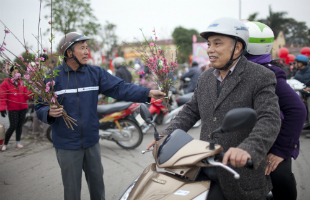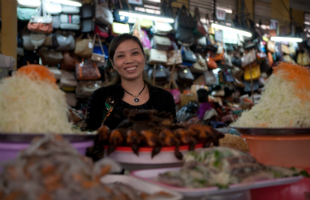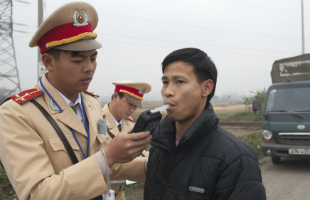
The lunar new year (Tet) is a time of joy and celebration, but as with any holiday period that involves eating, drinking and travelling, the risk of exposure to avian influenza, food poisoning and road traffic injuries is heightened in Viet Nam.
The World Health Organization (WHO) office in Viet Nam outlines simple precautionary measures to ensure that the Year of the Goat begins with good health, joyous and safe festivities.
"Tet is a time of happiness and a celebration of life. A number of simple precautionary measures can help people across Viet Nam to remain safe and healthy during the holiday season,” said Jeffery Kobza, Acting WHO Representative in Viet Nam.
Avian Influenza

Since March 2013, when the A/H7N9 virus was first detected in China, Viet Nam has been very proactive in keeping the virus at bay. However, with the surge in the movement, sale and slaughter of poultry during the Tet holiday, there is a corresponding increase in the risk of avian influenza. The main risk factor for human infection appears to be direct or indirect exposure to infected live or dead poultry or contaminated environments. The slaughter, defeathering, handling carcasses of infected poultry, and preparing poultry for consumption, especially in household settings, are likely risk factors.
Following these precautionary measures can help protect yourself, your family and your community from this very serious illness:
- Avoid contact with poultry that are sick or found dead
- Report sick or dead poultry immediately to the authorities
- Slaughter all poultry safely
- Clean cutting boards and other utensils with soap and hot water to keep raw poultry from contaminating other foods
- Cook poultry and poultry products thoroughly (do not eat pink meat, runny eggs or raw duck blood)
- Wash hands with soap and water before and after handling live poultry
Food Safety
Food poisoning remains a critical health issue in Viet Nam, causing severe illness and even death. Every year, approximately 200 major food poisoning incidents (involving 30 or more people) take place in Viet Nam. The total number of affected people by food poisoning in Viet Nam ranges from 1.2 million to 1.5 million annually. In severe cases of food poisoning it can cause death. Many cases of severe food poisoning occur at family feasts or mass celebrations. This usually happens because of a lack of hygiene and sanitation when handling and preparing food.
These simple practices help to reduce the risk of food poisoning:
- Always wash hands after going to the toilet and before and after preparing food
- When preparing meals keep raw and cooked food separate
- Cook food thoroughly
- Keep food at safe temperatures
- Use only safe water and raw materials
Road Safety

Over the course of the Tet holiday, millions of people will travel on Viet Nam’s roads to be with family and friends. High traffic volumes, fatigue and driving under the influence of alcohol increase the chances of serious traffic crashes. Road traffic injury is a leading cause of death and disability in Viet Nam, with an average of 35 people dying every day on the country’s roads. Hundreds more are seriously hurt and require lifelong care as a result. The risk of death and injuries can be substantially reduced by following safety behaviours such as these:
- Ensure that all motorcycle riders and passengers-(including children)--wear high-quality helmets
- If fitted in the vehicle you are travelling in, wear a seat-belt. Worn correctly, seatbelts have been shown to reduce the risk of serious and fatal injuries by up to 65%
- Do not exceed the speed limit or drive at a speed inappropriate for the road conditions (regardless of the limit)
- Never drive after consuming alcohol
- Do not accept lifts from people who you know have been drinking or who appear to be under the influence of alcohol
Drink Driving
Driving or riding after drinking alcohol (even very small amounts) significantly increases the risk of a road traffic crash. Alcohol consumption in Viet Nam is very high, especially amongst men and particularly during Tet celebrations. Statistics show that many crashes, injuries and deaths on Viet Nam’s road are the result of alcohol consumption by drivers and motorcycle riders.
Drinking and driving puts both the driver and other innocent people at risk of injury and death. Everyone needs to be responsible for their own behaviour and not drink and drive but if necessary, family members and friends should always be ready to intervene to prevent their loved ones from driving under the influence of alcohol and putting themselves and others in danger of a tragic outcome.
“On behalf of WHO Viet Nam, I hope that the Year of the Goat brings much happiness, luck, prosperity and most of all - good health and safety. Chuc Mung Nam Moi,” says Mr Jeffery Kobza.
